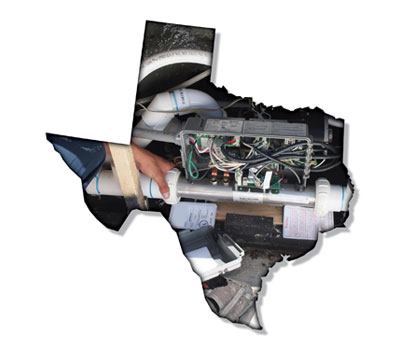Texas pool service companies offering to perform electrical work without having a staff member who is properly licensed now will be prosecuted according to the letter of the law.
The Texas Department of Licensing and Regulation announced in February that only licensed electrical contractors, or companies that employ them, will be allowed to advertise such services. All others are subject to fines starting at $500 per incident.
“After looking at how we treat most of our other statutes, we decided that in order to be consistent, we’re going to enforce the code just as it’s written,” said David Gonzales, compliance manager at the TDLR in Austin, Texas. “You cannot offer to perform electrical installations without the proper contracting license.”
That means any pool firm wishing to do electrical work is required to hold a Residential Appliance Installer’s license and a contractor’s license, or to hold a contractor’s license and employ one or more workers who hold an RAI license.
Though no changes have been made to the Texas occupations code itself, this announcement does clear up some apparent gaps between citation and prosecution.
“We had a couple of attorneys here who interpreted the law to say that as long as the statement that all work was done by a licensed contractor was on a company’s Website, that company was in compliance with the law,” said Jeff Rinard, the TDLR’s investigations manager.
Rinard explained that some companies (primarily sign builders) had been exploiting this interpretation of the law to offer supposedly subcontracted work, which was actually being performed by unlicensed in-house workers. This new position statement, then, is intended not to change any licensing requirements, but to ensure that unscrupulous companies are no longer able to use the law’s wording as a justification for advertising “subcontracted” electrical work.
Many pool service professionals who’ve been operating in compliance with the law say this announcement is good news because it will make it that much harder for unlicensed workers to underbid them.
“In my opinion, they’re actually interpreting the law correctly now,” said Noel Conley, owner of Miracle Pool Service in Garland, Texas.
Not all in the pool industry are as eager for stricter enforcement, however. “This is just another way for the government to make it more difficult for businesses,” said J.R. Richard, president of Richard’s Total Backyard Solutions in Houston. “And on top of that, they’re restricting our ability to advertise to our consumers, the ones who keep us in business.”
Since March 2003, Texas has enforced a licensing standard based on the National Electrical Code. In 2010, the TDLR joined with pool professionals across the state to launch the Residential Appliance Installer license, which allows pool servicepeople to become certified for pool-related electrical work without passing the state’s electrical contractor exam.
Despite occasional stings and crackdowns in the past, some in the industry have noted that enforcement of these licensing requirements has been somewhat uneven. But if this announcement is any indication, authorities are working to close such gaps.




